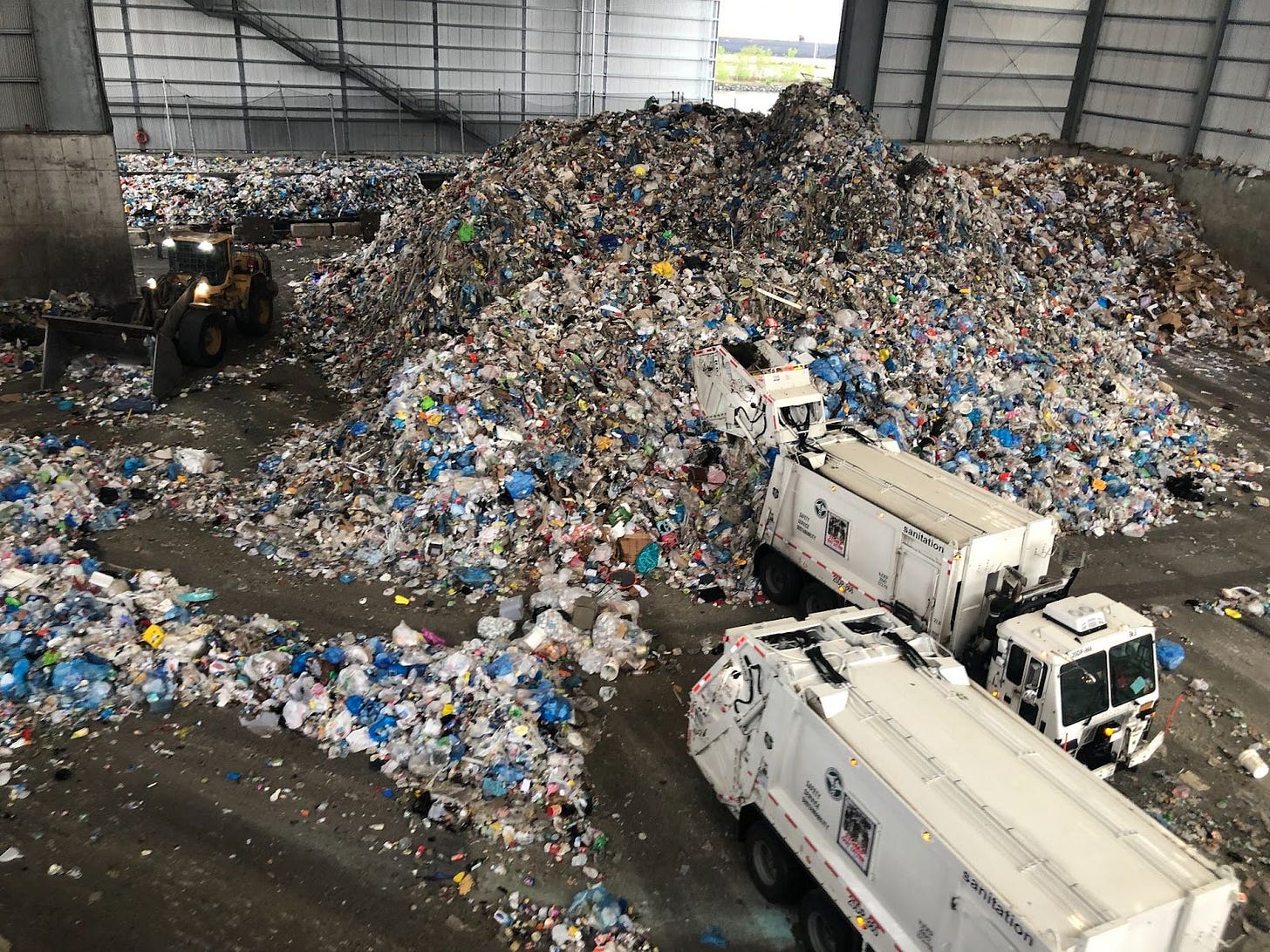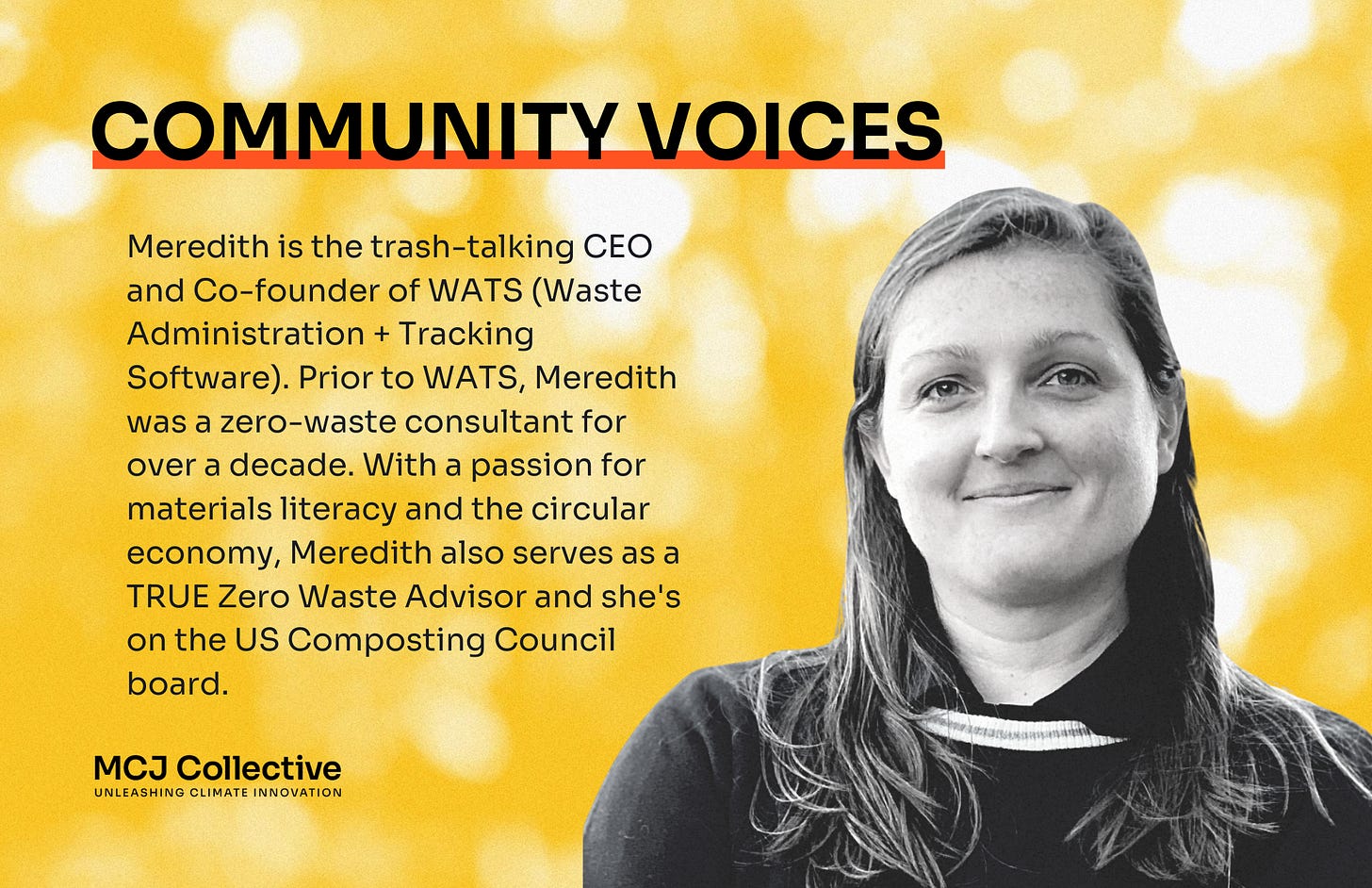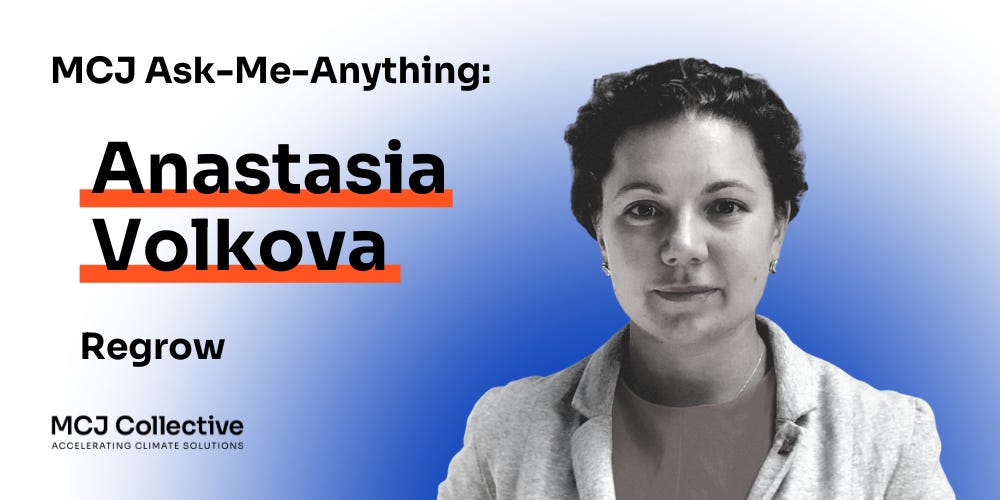Recycling Anxiety: The Trashiest Kind of Climate Anxiety
by Meredith Danberg-Ficarelli, CEO and Co-founder of WATS
A few years ago someone asked me what I did for a living and I said “My career is garbage.” They looked at me in horror, I blinked a few times, and followed with something like, “Huh, I didn’t mean to say it that way, but I’ll definitely be using it again.”
I’m obsessed with trash. More specifically, with the untapped value sitting in trash bags, dumpsters, and buried all over the planet. Nearly everyone touches waste every single day, yet we overlook it, think it’s useless and disgusting, and as long as it disappears on time, we generally don’t think about it at all. But waste management affects economic growth, public health, social justice, and the environment, just to name a few - and climate change is central to the shifting norms around how we think about waste. All materials theoretically have recovery and reuse value, and if they don’t, humans shouldn’t be using them anymore.
So wtf is recycling anxiety? You know that feeling you get when you walk up to a waste station and you have a split second where you look from bin to bin, look over your shoulder to see if anyone is watching, and then quickly shove everything into the trash can and disappear behind a row of cubicles? That’s recycling anxiety.
You think, what am I supposed to do? There are so many options! I heard recycling isn’t even real anyway. I have to put my phone down and extract my banana peel from my coffee cup?!

Cynicism and misinformation about recycling are STRONG. We’ve been gaslit for almost a century (check out this Throughline episode about the origins of the concept of littering, or season 6 of the Drilled podcast about the oil and gas industry’s big push to grow our dependence on single-use plastics as demand for fossil fuels falls). It’s no wonder you think recycling is a farce!
The norm today is that recovered materials (like cardboard boxes, metal cans, etc.), and raw materials are shipped all over the planet during the product manufacturing process. The Global North outsourced recycling to China for decades. But companies are relocalizing production as a result of unpredictable supply chains, and I’d wager that lots of the raw material needed to make new things already exist in products that we own and discard every day.
Recycling is real, and massive domestic investments are being made in growing North American recycling infrastructure so we can separate, clean, and recirculate materials into domestic supply chains. We need a massive rethink of how we recover and retain embedded value, and we must redesign products with disassembly in mind so their core components can be more easily reused.
As we transition from an extractive and linear economy to one that is regenerative and circular, humans will internalize a fundamental principle: there is no waste in nature.

Today, the economic value of recovered materials depends on market demand, commodity prices, recycling technologies, and the efficiency of collection and recovery systems. But the benefits of improved materials management extend beyond the value of the materials themselves:
Increased cost savings in waste management operations (this is an early value proposition of WATS)
Economic growth: more jobs are created through recycling and recovery than landfilling and incineration
Reduced harm to communities that host waste infrastructure (“waste equity” legislation focuses on this goal)
Increased materials efficiency and transparency (it’s not broadly the norm yet, but we can assign carbon values to recovered materials)
Waste management is stuck in the 20th century. Smart buildings can tell you to the minute how much energy is being consumed in a specific room in an office tower, but if you ask how much waste is being generated, whether a specific item is recyclable, or when the recycling truck is coming, you’ll probably be met with a shoulder shrug. Building transparency into materials management workflows, processes, and reporting is the first step we’re taking toward rebuilding a culture of recycling and materials literacy.

Here’s a non-exhaustive list of ways you can participate:
Check your municipality’s website to understand your local recycling programs - there are 9,000+ different municipal recycling programs in the U.S.
What materials are accepted?
Where do your recyclables go? Can you take a tour? Trust me, take the tour
What policies are under development? Can you testify at a public hearing, or sign a petition in support of new infrastructure?
Bonus: your municipality might use Recycle Coach or another app to help inform the public
Start composting. Do you have access to municipal pickups, a food scrap drop-off program, a small business “community compost collection” service, or can you compost at home with worms, bokashi, a backyard bin, or another method?
Gather data. You can conduct a waste audit at home or at work, to understand contamination, opportunities to shift purchasing, and get comparative metrics to benchmark against as you assess your expenses and make progress.
Refuse, Reduce, Rescue, Repair, Reuse, Recycle
Not sure whether something is recyclable or not? Don't "wishcycle"! Help avoid contamination and follow your local rules - when in doubt, throw it out.
At work, find or become an informal waste ambassador. Or go deeper and become a USGBC TRUE Zero Waste Advisor (and see if your company will pay for it).
Ask questions. And reach out if you need help!
Normalize talking trash, in the same way that we need to normalize talking about climate change.
✍️ The Draw-down
Weekly climate art featuring a page from Nicole Kelner’s coloring book.
🍿 The Lean Back
Learn about Regrow in this MCJ Startup Series episode.
🎙️ My Climate Journey Podcast
🏦 Cody talked to Sara Harari, Associate Director of Innovation and Strategic Advisor to the president at Connecticut Green Bank, about the world of green banking. Listen to the episode here.
💰 In Jason’s Capital Series, we heard from Rob Day, Co-founder and Partner at Spring Lane Capital. Rob has a wealth of valuable insights and Spring Lane's approach adeptly addresses the widely discussed capital disparity between early-stage venture capital and project finance. Tune in to the Capital Series here.
🧑🏭 Yin sat down with Mark Martin, the regional director for advanced manufacturing for the Bay Area Community Colleges. They discussed why manufacturing jobs are so critical to climate tech solution scaling and Mark's role in helping match the talent supply to the growing demands for these skill sets. Listen to the Skilled Labor Series here.
👩💻 Climate Jobs
For more open positions, check out the #j-climatejobs channel in MCJ Slack as well as our MCJ Job Board.
Mechanical Engineer at AMP Robotics (Louisville, CO)
Senior Engineering Manager at Arcadia (Remote)
Program Manager at Bloc Power (New York, NY)
Senior Software Engineer at Lightship (San Francisco, CA/Boulder, CO)
Account Manager - South Africa at Odyssey Energy (Remote)
Coastal Restoration Internship (GIS focus) at Running Tide (Remote)
Senior Account Executive (LATAM) at SINAI (Remote/Brazil)
VP, Manufacturing at Twelve (Alameda, CA)
✨ Community Highlights
👩🌾 The Climate Farm School program at Terra.do is a unique opportunity for adult professionals to get their hands dirty on a regenerative farm while learning about climate solutions within sustainable food systems. Applications are open for summer/fall 2023 courses, with host farms in California, Hudson Valley, Lopez Island, and Tuscany. Learn more about the program and apply here, or contact Laney Siegner with any questions: laney@terra.do.
🌟 Venture Houston 2023 is spotlighting the path of decarbonization in the digital world by bringing together prominent venture capitalists from across the nation along with Houston’s most innovative corporates and high-growth startups. This year will kick off with Carmichael Roberts, co-lead of the investment committee at Breakthrough Energy Partners, Reginald DesRoches, President of Rice University and our very own, Cody Simms, Partner at MCJ Collective. Learn more here.
🗓 July Events
Click the event title for details & RSVP info. For more climate events, check out the #c-events channel in MCJ Slack.
🌾 MCJ Ask-Me-Anything with Dr. Anastasia Volkova, CEO and Co-founder of Regrow: Regrow was named Fast Company's number one most innovative company in agriculture in 2023. RSVP and get your agri-food questions ready! (7/13)
👩💻 MCJ Climate Career Advancement Meetup: If you are thinking about advancing your career to work in climate, please join us for an hour of learning and networking. (7/12)
🇬🇧 MCJ London x BeZero x Patch: Carbon Markets - A View of the Future Showcase: We'll be looking ahead to the future of carbon markets by digging deep into challenges facing the supply side, demand side and intermediary organisations today, scoping what steps we need to take as an industry over the next few years, and brainstorming how different stakeholders can lean in further and get involved. Join us at BeZero’s HQ on Thursday, July 13. Details here.
💡 Monthly Idea Jam - Consumer Behavior x Climate: These sessions provide a chance for MCJ members to get help with roadblocks, meet co-founders or future employees, connect with investors, or people working on similar topics. For people just listening in, these sessions may spark your own ideas, and in the process enable you to meet others. (7/14)
🍻 MCJ DC July Meetup: Join this monthly informal gathering of climate tech enthusiasts. (7/17)
The MCJ Collective Newsletter is a free weekly email curating news, jobs, My Climate Journey podcast episodes, and other noteworthy happenings in the MCJ member community.
💭 If you have feedback or items you’d like to include, feel free to reach out.
🤝 If you’d like to become an MCJ community member, apply today.
💡 Have a climate-related event or content topic that you'd like to see in the MCJ newsletter? Email us at content@mcjcollective.com




